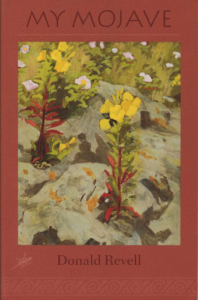Joyelle McSweeney Reviews Donald Revell's My Mojave
Donald Revell
Alice James Books, 2003
Reviewed by: Joyelle McSweeney
August 16, 2003
// The Constant Critic Archive //
Injured hymns came issuing from the vicinity of Donald Revell’s previous volume, the elegiac Arcady; his new book, My Mojave, stands the respective ground of its title. It would be difficult to select two regions that pose a greater contrast than Arcady and the Mojave. The former is ideal, pastoral, static, and remote; it is always, and essentially, former. The latter is real, arid, dynamic, and accessible; it includes Las Vegas.

Revell does not observe the dichotomy. Instead, his Mojave is doubly saturated—material and ideal, ugly and beautiful, Mojave but, as the prefatory poem tells us, ‘Arcady Again’. Arcady, as all realms dreamt, read about, devoutly expected, or ecstatically envisioned, is coincident with the very here and now which it is the poet’s (and the reader’s) good fortune to attend.
These new poems have a surprisingly light touch but a buckling spatiality, where doors to other worlds stand in for and stand inside material doubles. ‘Arcady Again’ begins with a sensually described walk on a rainy path; the second stanza continues
God help the man who breathes
With nothing leading him
Here or someplace like it
Inside him which he opens
Wide enough to walk through
And walks through
With devices no flashier than enjambment and capitalization, Revell evokes the flexing ambiguity of an ‘opening’ world. Is God implored idiomatically, because “the man” is beyond help, or sincerely, because “the man” is on the verge of transcendent experience? Accordingly, is it exemplary or pathetic to breathe “[w]ith nothing leading one”? Does the man breathe “[h]ere” or “[w]ith nothing leading him/Here”; has he arrived or will he never arrive? Positioned after this welter of possibilities, the impossible situation of a man opening and walking through a “someplace” within himself is legible, and possible. The profound becomes the solid ground.
My Mojave is divided into ‘HERE’ and ‘THERE’, but the distinction between the sections seems more rhetorical than geographic. ‘HERE’ includes ‘The Government of Heaven,’ which demonstrates contiguity between the celestial speculations of poets and ads for strippers in the Las Vegas Yellow Pages. Yet Revell’s vision is never ironic. Instead, the speaker’s role as present yet permeable boundary underwrites such textual minglings. ‘My Trip’ reveals the remarkable within a mundane journey:
A day and a day, more rivers crossing me
It really feels that way, I mean
I have changed places with geography
This effortless stanza speaks accurately to the place of the speaker in this poem, and perhaps all poems, while revising Heraclitus’s infamous gloss on temporality and perspective. When in the next stanza the speaker remarks, “I think I could turn and live underneath the animals/I could be a bottle cap,” this seems literally possible because of the riverbed testimony that precedes it. Listless Prufrockian longing is here replaced by a universe in which ecstatic proximity yields possibility. The part, impossibly, contains the whole, “[f]orever at just the right moment.” Or, as this poem concludes, “Catching a glimpse of eternity, even a poor one, says it all.”
“Catching a glimpse of eternity” seems the overt project of the second half of this volume. The poems in ‘THERE’ are laden with epigrammatic content, and some poems read or conclude like letters sealed between the speaker and his Maker. This may be less engaging for some readers, but seems to be what Revell is intent on exploring in future volumes, if the final line of the final poem should be believed. The show-stopping poem in this section is surely the expansive ‘Prolegomena,’ in which the speaker wrestles with a catalogue of possible modes and expressions while, with superior ease, his God does the same:
[…] God is a wild thing
Or still a flower
And then arrives as a beautiful boy.
I see his wagon
Now in this now in that animal.
“Invisible Green,” Revell’s diaristic column in APR, offers impressions of, for example, a Cirque de Soleil performance, or an Alabama springtime, all hanging from the delicate crossbars of Revell’s pet themes and literary heroes, themselves often referred to by prenom. Speaker Revell, usually situated at his writing desk, becomes the tensile center from which this Calder-like structure is suspended and around which it subtly revolves. It is easy to see My Mojave as the correlative of the beguiling poetics set forth in this column. Like “Invisible Green,” My Mojave is at once fondly intimate and fondly adamant about its contents. What it assumes we shall assume. To the willing reader, it proffers large and small revelations.
COMMENTS:
None.